Rock On Chicago
The larger than life and times of Chicago artist/musician Wesley Willis—as well as the deeper inspirations behind the artistic output that defined his life.
Hey guys, Ernie here with a fresh Tedium piece comes from outsider artist aficionado and newsletter contributor David J. Buck, who hit us up last time with a piece on Wild Man Fischer. By popular demand, here’s a piece on Wesley Willis!
“His songs were simultaneously disturbing, hilarious, blunt, and intoxicating. Wesley’s sheer excitement and unaffected honesty about every cultural phenomenon, defined his music as truly individual, and truly punk rock.”
— Jello Biafra, Wesley’s number one fan. He’s also the former lead singer of the punk band The Dead Kennedys and owner of the Alternative Tentacles label. A good friend and ardent supporter of Wesley’s, Biafra released six of Wesley’s albums on his Alternative Tentacles label, including three Greatest Hits volumes. Wes wrote a tribute song for him, fittingly called “Jello Biafra.”
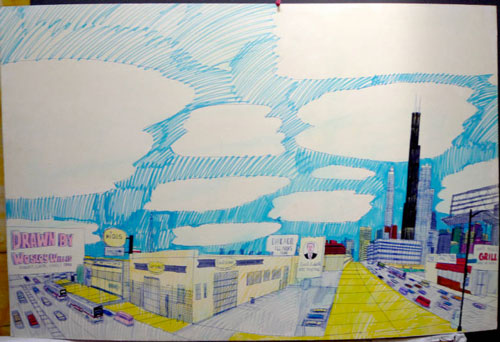
"Roosevelt, Clinton, and Canal," a 1990 Wesley Willis drawing. (Daniel X. O'Neil/Flickr)
Wesley Willis loved to ride on public transportation, and it heavily influenced his art
The story of Wesley Willis is deeply rooted in Chicago. Prior to taking up the keyboard and expressing himself musically, Willis spent his days riding buses and creating fantastic, drawings of city, vehicles and the public transit systems of Chicago. Much of his early artistic life consisted of Willis sitting on a street corner or public area, drawing and selling his inspired pen-based artwork. Because of this, Willis became so well-known around Chicago, and sold quite a bit of his artwork. A 2008 documentary, Wesley Willis’s Joyrides, offers an in-depth look at this aspect of Wesley’s life.
His inspired, pen-on-pen drawings show off Wesley’s true talent—his artwork. His renditions of the Dan Ryan Expressway are truly a sight to behold. (The art website Brut Force has a thorough tribute to Wesley’s art, with plenty of examples.)
In the late 1980s, a short documentary about Wesley’s artwork was made for public television. According to its producer, Carl Hart, it never aired. In it, Wesley tells us more about his art than just about anyone else can.
Incredibly sweet, good-natured, and friendly, Wesley liked everyone and always introduced himself wherever he went. After being diagnosed with schizophrenia following an incident with his mother’s boyfriend robbing and threatening him, Wesley began hearing voices in his head. The voices—which he referred to as demons—were named Heartbreaker, Nervewrecker and Meansucker.
They berated him, shouted obscenities, and provoked him into outbursts. He began listening to music at high volumes to drown them out and made his own music to fight them. His medication and a large support system helped him partially overcome these issues to become an unlikely rock star. Because he enjoyed riding the bus so much, he associated good times with public transportation and referred to his high periods as joyrides. When Wesley felt down, bad or angry, he would go on a hellride—a metaphorical low or negative period, predominantly associated with the demons.
In the 1990s, Willis picked up a Technics KN 2000 keyboard, found a few settings he liked and began to write songs in earnest. He remained a prolific songwriter for the rest of his life. Through the course of the decade, he self-released a substantial number of recordings on his own, many of which sound remarkably similar to each other. Never one to back away from his art and passion, Wesley used much of his original artwork as album covers.
“Rock over London, Rock on Chicago. Wheaties, Breakfast of Champions.”
— Wesley Willis, from his song “Rock and Roll McDonald’s.” Willis used the “rock over London, rock on Chicago” tagline to end his tunes, often before uttering a commercial tagline.
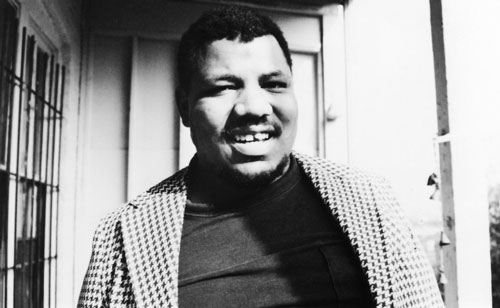
(via Willis' Bandcamp page)
Many of Wesley’s songs have quite humorous lyrics—with mildly serious undertones
Even Wesley’s funny songs can carry a light sense of social commentary to them.
“Rock and Roll McDonald’s,” for instance, begins as a rather funny take on why people go to McDonald’s (to get down to the rock music and eat Big Macs), but eventually ends with Willis telling the audience how bad their food is for you, including the amount of fat content in both a Big Mac and Quarter Pounder. Many of his songs are similar in style and musical accompaniment.
At other times, he’d sing about events he heard about or witnessed, in a distinct syncopated, spoken word style over keyboard accompaniment. The song structure is always the same--each verse is done in spoken word style, with the chorus typically consisting of the song title repeated four times, slightly off key. Every song ends with the phrase “rock over a London, rock on Chicago,” typically followed by the utterance of a commercial tagline from the era. Based on a content analysis of the songs on his Greatest Hits album, “Mitsubishi-it’s a whole other level” seems to be a personal favorite.
Friends (“Tammy Smith”), current events (“Larry Nevers/Walter Budzyn”), tributes (“Elvis Presley”), concerts he’s attended, his struggle with his mental illness (“Outburst,” “Chronic Schizophrenia”) and his weight (“Sorry I Got Fat”) all pop up often as song subjects.
Songs like “Outburst” and “Chronic Schizophrenia” offer detailed looks into Wesley’s struggle with his mental illness. The former is, perhaps, the most lucid and coherent of the two. Other songs are just plain funny, chiefly “Cut the Mullet” and his very own Halloween tune, “Vampire Bat.” Then, of course, there are songs where he beats up superheroes: “I Whupped Batman’s Ass” is a fan favorite.
His work with the Wesley Willis Fiasco fits nicely in the punk atmosphere of the 1990s. Backed by a trio of talented punk musicians, Willis manages to take his work to a completely different level. Highlights included “Jesus is the Answer,” “He’s Doing Time in Jail,” and “I’m Sorry I got Fat,” a story chronicling Wesley love hate relationship with McDonald’s and his apology for gaining weight. The bass line and the song is incredible and it reminds me of early Primus. Rounding it out, is an incredible rocking back over which Wesley wraps most of the lyrics. When he sings the chorus, it’s powerful and poignant.
Wesley also wrote some rather scatological material--songs like “Whip the Llama’s Ass” and “Suck a Caribou’s Ass,” among many others--fall into this category, because it helped drown out and repulse the demons in his head. Music was a form of therapy for Wesley, and these types of songs were only one aspect of this method.
Despite the similarity of the songs and the somewhat disjointed flow of the albums, most of them are a joyful, engaging listening experience, even if the songs favor the side of brevity.
2:50
The optimum length for a hit rock song, according to Wesley. The story goes that he once heard somebody say something to this effect, and the idea stuck in his head. A recording session in The Daddy of Rock and Roll shows him working with friend/engineer, Dale, trimming a few freshly recorded tunes to within three seconds of this time frame. Because of this effort in the studio, most of Wesley’s songs hover around the 2:50-2:52 mark.
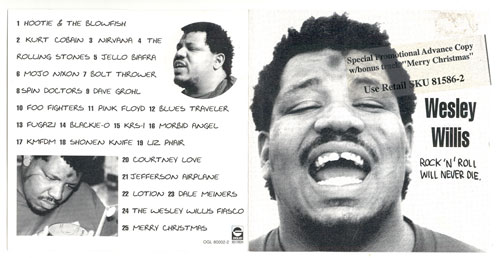
The cover and sleeve for "Rock'N'Roll Will Never Die," a 1996 Willis album. (via the Wesley Willis CD Repository)
No definitive list of Wesley Willis albums exists online
Willis was a prolific artist and produced a great many albums of his songs, self-releasing the majority of them himself. Some of his albums saw release on various labels such as Oglio (Rock and Roll Will Never Die), American (Fabian Road Warrior, Feel the Power), Urban Legends (Spookydisharmonious Conflicthellride), and Alternative Tentacles.
If the latter label’s name sounds familiar, it’s probably because Alternative Tentacles were home to the Dead Kennedys in the 90s, along with such notable punk acts as the Butthole Surfers and outsider punk group Half Japanese (founding member Jad Fair later recorded solo with outsider musicians R. Stevie Moore, Daniel Johnston, and many others).
The question remains, however, just how many albums did he record and release? The artist’s own website does not provide this information, nor does any other resource I could find online. Discogs lists 29 albums, but this is far from complete. On the Wesley Willis subreddit, someone has begun making a full list of Wesley’s CDs, though the project appears to have stalled. Elsewhere, varying reports put the number anywhere from 50 to over 100. So, which is it? It’s hard to say for certain, but one man may have part of the answer.
Derek Erdman was both a friend and fan of Wesley’s from Chicago. He worked in a record store in the late 90s, and began buying CDs from Wesley. A few years later, he ran into Wesley while attending an art show and was surprised Wesley remembered his name. He describes Wesley as “such a sweetheart. He was a big, positive teddy bear. You only meet a person like him once in a lifetime.” He even received 2 or 3 of Wesley’s friendly head-butts.
Over the past decade Derek’s taken up the mantle of Wesley Willis Musical Archivist, attempting to curate an online archive of Wesley’s albums, the Wesley Willis CD Repository. Shortly after Wesley’s passing, Derek decided to share his personal collection with the world for two reasons: to prevent unscrupulous sellers online from trying to profit from Wesley’s death, and to help share Wesley’s musical gift with the world.
“I was on the fence for a while over keeping them up,” he explained, “but I’ve received a lot of positive messages from fans and people close to him for making them available. Nobody has ever given me a hard time over it, so that seemed like a good enough justification to me to keep them up forever.”
The albums are posted for posterity, and while it’s by no means an exhaustive list of Wesley’s work, it may provide an excellent jumping point into his unique world.
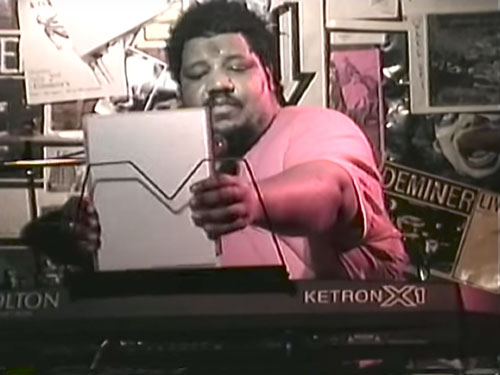
Wesley Willis, shown at a 2001 concert in Lubbock, Texas. (YouTube screenshot)
The Wesley Willis concert experience
Willis, an avid fan of rock music, attended numerous shows throughout his life. One of his most popular albums—and many of his songs—irreverently document these shows. His 1996 album, Rock and Roll Will Never Die, on Oglio Records, showcases his thoughts, feelings and reviews of the bands he’d seen perform live.
Not one to be content with merely recording and selling his own CDs, Willis managed to find a way to tour the United States, performing his music to some rather enthusiastic audiences. In addition to performing solo with his keyboard, Willis formed a punk group called The Wesley Willis Fiasco. This group of talented musicians backed him up on a number concert dates, juxtaposing a punk rock aesthetic with Willis’s unique style.
Greg Chance—a California-based Wesley Willis fan—fondly remembers the Wesley Willis solo concert he attended on Nov. 6, 1995. At the time, Greg lived in the college town of Chico, in Northern California. One day—he doesn’t recall where—he saw a poster advertising an upcoming Willis show at a club called the Zocalo Room. As an avid fan of The Dr. Demento Show, Greg knew the name and music associated with Wesley Willis and bought tickets immediately.
Greg attended the show because of a genuine love and appreciation of Wesley’s music, but didn’t feel others shared his enthusiasm. He recalls, “It was pretty obvious early on that the attendees were there for the irony, or at the very least, laughing at Wesley because he was ‘stupid’ or shtick. I was there because not only was he unique, but I strongly felt—and still feel—that if he’s making the effort financially and artistically to support himself, and I admire him in any way, I should go support what he’s doing.”
His memories of the experience are tremendously positive, and he was struck by how Wesley managed to earn a living doing essentially spoken word pieces over pre-programmed keyboard music. Greg met Wesley, bought a CD, which Wesley autographed by writing his first name in large, all-capital block letters. He doesn’t recall the set list for Wesley’s 45-minute set, but remembers Wesley playing “I Whupped Batman’s Ass” and “Whip the Llama’s Ass” for sure. Greg is certainly a fan of outsider music and leaves us with his thoughts the idea of folks like Wesley and Wild Man Fischer not being sincerely appreciated during their lifetimes.
He says, “I just hope that many of the listeners have moved beyond listening with irony and appreciate the artist.”
“Say ‘Rah!’ Say ‘Rroowr!’”
— Willis, in the short documentary Daddy of Rock & Roll, prior to giving one of his infamous soft head-butts to a friend. Willis liked to show affection and greeting in this rather unconventional manner, resulting in a permanent bruise on his forehead.
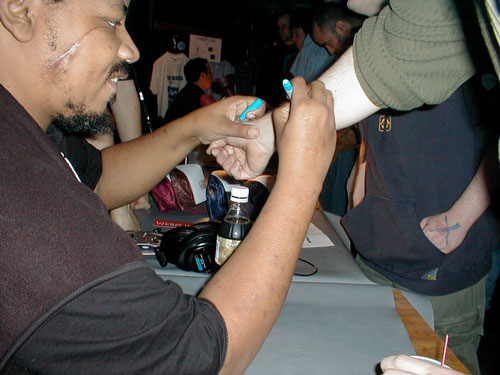
Willis, shown signing a fan's arm. That arm is probably worth a lot of money these days. (Chris Devers/Flickr)
The life of the party: what Wesley was like in person
By some accounts Wesley was a larger-than-life presence, in addition to being quite loveable. Charles (Chuck) French, another fan and friend, once invited him to perform at a house party.
While attending a show at the Empty Bottle in Chicago, Chuck noticed Wesley sitting by the pool tables, selling artwork. The pair had met one time previously—exchanging head-butts and becoming friends. Chuck decided to invite Wesley to play a show at his house, a place he called “The Milk Factory,” where he and his friends often hosted shows.
Wesley came by the Milk Factory on the Saturday following his invite, keyboard in-hand and spent the entire day jamming with Chuck. Wesley wrote over twenty songs throughout the day—mostly about Chuck and his friends--before performing his own set. At one point, Wesley was introduced to tofu-pups—vegetarian hot dogs—through the barbecue Chuck hosted at the event. Chuck recalls a hesitant Wesley sweetly and politely asking for two tofu-pups after learning what they were. Throughout the night, Wesley was the life of the party, but unfortunately, the couch he’d been sitting on broke at some point during the evening. Chuck recounts the story:
“I think he had a great time. He played over an hour long set. It was a blast having him over the house for the day. he made lots of friends and got turned on to tofu pups. and when it was 2 am, he had me call his ride, and he left. The couch he sat on made the ultimate sacrifice. It was a super cool vintage twelve-foot long golden boat of a couch, found in the alley behind division and damen. It was returned to the alley behind the Milk Factory.”
Wesley commemorated the occasion by writing a song about French’s band, “Peralta Can Rock.”
Tragically, 2002 brought terrible news for Wesley: a leukemia diagnosis. On August 21, 2003, Wesley passed away from complications from surgery. He was 40 years old.
Wesley Willis brought joy and humor to everyone he came into contact with and is remembered quite fondly today. In interviews and documentaries, he comes across as sweet, polite and genuine. I think I would have enjoyed chatting and jamming with Wesley, and it’s a shame he was taken from this world far too soon.
Beloved by most of the people he met, it’s no surprise a heartfelt tribute from fans, friends and family appeared shortly thereafter, on the Alternative Tentacles Wesley Willis Tribute Page. Through five pages of touching quotes and tributes from all over the industry, a quote from Jello Biafra stands high above the rest.
“The voices in Wesley’s head can’t yell at him and put him down any more. Wes was deeply religious. He was afraid that if he died he would no longer get to go see bands play. If there is a hereafter I hope he’s right up front as Jimi Hendrix, Stevie Ray Vaughn, his beloved Otis Redding and his dear friend Bradley from Sublime ‘storm the stage’ as the crowd ‘roars like a sea monster.’
“All opening for Wesley, of course.”
:format(jpeg)/2017/11/tedium111617.gif)
/2017/11/tedium111617.gif)

/uploads/david_new.jpg)